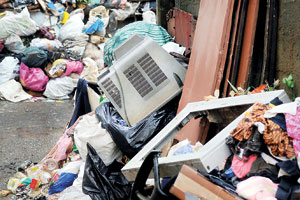News
Flood e-waste hazard warning

Pic by Amila Gamage
Electronic waste (e-waste) items such as television sets, fridges, computers and small electronic devices that have been destroyed by the floods have been dumped in huge piles mixed in with household waste.
Flood victims who now have nothing left are beginning to reconstruct their lives by gathering what they can, discarding the rest to simply make a fresh start.
A visit to the devastated areas showed poor management of flood waste and little done to tackle the problem of e-waste mixing with flood waste coming in to local garbage dumps.
“The clean-up of the rubbish has been organised and taken over by the tri-forces and the local councils,” Disaster Management Centre (DMC) Assistant Director Pradeep Kodippili said.
In contradiction, the Colombo Municipal Council’s Director of Engineering (Solid Waste Management), Y. Sylvester, stated, “We are not involved in the clean-up as the areas affected fall short of our jurisdiction”.
Parts of the Colombo Municipal areas were, however, affected by the floods.
The Central Environmental Authority (CEA) also denies responsibility, with its Director of Waste Management, G. Werasundara saying, “Local authorities and registered collectors are responsible for collecting the waste. We are only a regulatory body; we can only enforce the Environmental Act.”
The dumping of e-waste in common garbage sites can contaminate the groundwater system because it contains heavy metals which can subsequently enter the food chain, environmentalist Supun Lahiru Prakash pointed out.
“Heavy metals can seep into the rivers and canals that are used for agricultural, crop and animal production. There is no proper analysis of the water; the Water Board only considers such things as E-coli and not the amounts of heavy metals. These metals slowly build up and can cause serious health effects,” Mr. Prakash said.
He pointed out that there are registered e-waste companies that could have been notified and brought into joint action with local authorities in the flood-affected areas.
“Ultimately the responsibility lies with the Central Environmental Authority,” he added.
“After two weeks there are still no proper plans or locations to discard the waste let alone separate the e-waste from household waste,” Sanjeewa Chamikara from the Environmental Conservation Trust said. “Nobody is even in charge of the separation or collection. Unfortunately, e-waste is getting into the normal dumps and will badly affect the environment.”
“There is evidence,” Mr Chamikara claimed, “that companies are exploiting this disaster to release chemicals such as dyes and acid in the already polluted waters to disguise their wrongdoing. This is evident in a layer of oil in rivers and canals.”

